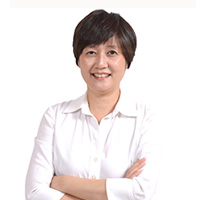
He was as bold as he is young.
Pianist Lim Yun-chan, shorn of his heavy, wavy mane, walked onto the stage at Seoul Arts Center Concert Hall Saturday, his stride confident, his first step a loud thump. He sat himself in front of the piano and, without a second’s hesitation, hit the first note of Orlando Gibbons' “Lord Salisbury,” Pavan and Galliard.
Lim, who, at 18, became the youngest ever winner at the prestigious Van Cliburn International Piano Competition in June began his recital with a work by the English Renaissance composer that is not often performed in Korea.
The novelty of the piece required of the audience greater attention than usual. So began Lim’s second recital in Korea since his phenomenal Van Cliburn win, on an unfamiliar ground.
At the press conference held before the concert, he was asked about his recital program. He acknowledged that people were expecting him to perform Rachmaninoff’s Piano Concerto No. 3, the final piece that he performed in Texas. But he wanted to give the audience something new. “I thought it won’t do to play the same piece,” he said.
So, instead of the powerful and dramatically effusive Rachmaninoff, Lim chose Gibbons. The choice reflected the young pianist’s desire to perform works that are lesser known. At the same time, it showed his respect for the work of the iconic Canadian pianist Glenn Gould, a champion of Gibbons and J.S. Bach.

J.S. Bach’s 15 Three-part Inventions, “Sinfonia,” for Keyboard that followed was played in the order in which Gould had performed it at the Salzburg Festival, starting with Sinfonia No. 1 in C major and concluding with No. 9 in F minor, rather than following the original order of ascending key.
Bach sang about life, from birth to death, in this piece, Lim had explained. At his hands, “Sinfonia” was lyrical, verging on romantic -- far removed from the precise, mathematical sound often associated with contrapuntal works of the Baroque period.
In Lim’s performance of Liszt’s “Two Legends,” you could hear the birds sing as St. Francis of Assisi preaches to them. The child-like purity and crystalline innocence of the “St. Francis of Assisi's sermon to the birds” gave way to the violent crush of waves in “St. Francis of Paolo walking the waves.” Pounding out crushing waves on the keyboard, Lim put up a valiant struggle against the raging sea, octave after octave, along the entire length of the keyboard.
Lim took a long pause, just enough time for the audience to take a breath after a harrowing journey, before commencing Liszt’s “After Reading Dante.” The sheer physicality of the piece was demonstrated in the way Lim’s body moved with the music. It was a tour de force that had the audience on the edge of their seats. The brilliance of the performance and the swelling emotions from someone yet in his teens was simply breathtaking.
On Thursday, Lim’s management company announced that Lim will be performing Rachmaninoff’s Piano Concerto No. 3 with the New York Philharmonic Orchestra led by James Gaffigan at the Lincoln Center in New York in May.
As Lim walked away from the stage on Saturday for the last time after two encores, he looked over his shoulder, as if to see his audience one more time.
Lim said that he wants to open up a new universe for people with his music making. He did just that for the more than 2,000 people who packed the concert hall that day.
Kim Hoo-ran is the culture desk editor at The Korea Herald.
-
Articles by Kim Hoo-ran







![[Weekender] Korea's traditional sauce culture gains global recognition](http://res.heraldm.com/phpwas/restmb_idxmake.php?idx=644&simg=/content/image/2024/11/21/20241121050153_0.jpg&u=20241123224317)









![[More than APT] Residents, architects together design homes](http://res.heraldm.com/phpwas/restmb_idxmake.php?idx=652&simg=/content/image/2024/11/24/20241124050036_0.jpg&u=)
